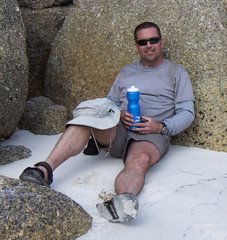
As I ran through a park in Sydney last weekend on a training run, I spotted an Ibis standing on the edge of garbage bin. I had run about 25 km at this stage, so I figured that this would a great spot to have a stretch.
As I re-limbered my tired legs, I watched as the Ibis used its curved beak to lift out rubbish from the bin and drop it to the ground. What struck me was how adept this particular bird was at levering the tops off take-away food containers and the like, so that it could get at the contents.
I'm no ornithologist, but I'm also pretty sure that the diet of an Ibis doesn't generally include hamburgers, Beef and Blackbean or Red Bull.
Maybe it was the exercise endorphins that were coursing through my veins, but as I continued my running journey back across the Sydney Harbour Bridge and home, I thought about people and organisations that are like the Ibis.
What???
Long legged with curvy beaks?
Well, not really. But I do often see people and organisations that have not really adapted to new situations completely. They have made a few minor adjustments - the fiddling around the edges - but they haven't really committed to a change and made the almost evolutionary adjustments needed.
What do I mean?
I'm pretty sure that if you were going to design a bird (or any animal) to scavenge from left over human food, it wouldn't really look like the Ibis. This is not to say that the Ibis isn't reasonably effective at what I saw this one bird doing. Indeed, you could suggest that fishing trash from a bin is much easier than fishing worms, fish and other small creatures from shallow water that the Ibis regularly needs to do.
And that's just the point. Often we stop as individuals and organisations when we have made some of the adjustments necessary to be a little more effective and perhaps marginally more efficient. But is that enough? How would we look if we could start from scratch in designing our work or our lives? Would be different? Would we be better?
Are you an Ibis?
As I re-limbered my tired legs, I watched as the Ibis used its curved beak to lift out rubbish from the bin and drop it to the ground. What struck me was how adept this particular bird was at levering the tops off take-away food containers and the like, so that it could get at the contents.
I'm no ornithologist, but I'm also pretty sure that the diet of an Ibis doesn't generally include hamburgers, Beef and Blackbean or Red Bull.
Maybe it was the exercise endorphins that were coursing through my veins, but as I continued my running journey back across the Sydney Harbour Bridge and home, I thought about people and organisations that are like the Ibis.
What???
Long legged with curvy beaks?
Well, not really. But I do often see people and organisations that have not really adapted to new situations completely. They have made a few minor adjustments - the fiddling around the edges - but they haven't really committed to a change and made the almost evolutionary adjustments needed.
What do I mean?
I'm pretty sure that if you were going to design a bird (or any animal) to scavenge from left over human food, it wouldn't really look like the Ibis. This is not to say that the Ibis isn't reasonably effective at what I saw this one bird doing. Indeed, you could suggest that fishing trash from a bin is much easier than fishing worms, fish and other small creatures from shallow water that the Ibis regularly needs to do.
And that's just the point. Often we stop as individuals and organisations when we have made some of the adjustments necessary to be a little more effective and perhaps marginally more efficient. But is that enough? How would we look if we could start from scratch in designing our work or our lives? Would be different? Would we be better?
Are you an Ibis?


No comments:
Post a Comment